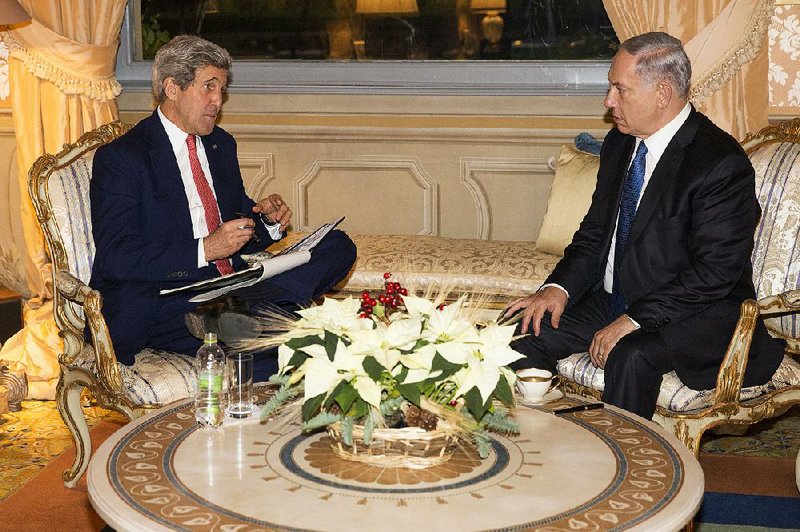ROME -- Israeli Prime Minister Benjamin Netanyahu and Secretary of State John Kerry held talks in Rome on Monday during efforts to avert a showdown at the United Nations over the Palestinian statehood campaign.
Palestinian officials said President Mahmoud Abbas will push for a U.N. Security Council vote this week on a Jordan-backed resolution outlining a final peace deal with Israel, setting a November 2016 deadline for an Israeli pullout from lands sought for a Palestinian state. The plan will be presented to the U.N. on Wednesday, Palestinian Liberation Organization official Hanna Amira said in a phone interview.
Israel opposes the plan, which would require it to withdraw to lines it held before the 1967 Middle East war. The United States, Israel's strongest ally, also says Palestinian statehood should be negotiated, and it may use its veto at the Security Council to block any resolution.
"The American government has backed our policy for 47 years that any solution between us and the Palestinians will be done through negotiations," Netanyahu told reporters after the meeting. "I don't see any reason that would change."
The premier declined to say whether he received a U.S. commitment to use the veto. Kerry, who didn't immediately comment after the meeting, will hold talks with senior Palestinian officials in London today.
U.S. officials say Kerry does not consider acceptable either the resolution or a separate France-led statehood proposal.
Abbas consulted with members of his Fatah movement and the Palestine Liberation Organization at a meeting Sunday. Participants at that meeting decided to push for a vote Wednesday on the Jordanian resolution, Palestine Liberation official Wasel Abu Yousef said. However, they set another meeting for tonight, suggesting that decision might change.
Another Palestinian official said the Jordanian proposal has the support of only seven members of the 15-member council, meaning it would be defeated even without triggering a U.S. veto. The official spoke on condition of anonymity because he was not authorized to discuss diplomacy with journalists.
The Palestinian push at the Security Council is largely symbolic. Abbas is under pressure after U.S.-led talks between Israel and the Palestinians collapsed in April.
The Palestinians say they are turning to the U.N. in frustration after more than two decades of failed peacemaking, which they and the Israelis each blame on the other. The U.N. campaign comes as violence between the sides is surging, and Israel prepares for early elections.
"We are in a confrontation now with the U.S. because it doesn't support our U.N. Security Council move," Palestinian Foreign Minister Riyad al-Malki told official Voice of Palestine radio Sunday. "The U.S. wants us to postpone this move until after the Israeli elections," he said, adding without elaboration that there is "direct American pressure on the financial and political level."
A State Department official, speaking on condition of anonymity to discuss confidential talks, said the U.S. opposes any deadline for the withdrawal of Israeli troops from the West Bank.
The U.S. has used its veto in the Security Council dozens of times to shield Israel from U.N. criticism. It may be more reluctant to do so now, after legislatures in seven Western European nations recently endorsed Palestinian statehood. While the endorsements carry no legal weight, they increase the pressure on Israel to do more to resolve the conflict.
Palestinian officials say they've delayed submission of a draft resolution while they work with European countries, primarily France, to fine-tune the text. Europeans are working on an alternative text.
Netanyahu said Monday that he spoke to French President Francois Hollande a few days ago and "told him I think that the move is negative and will bring the opposite of what is intended," undercutting peace negotiations. The last talks, brokered by Kerry, collapsed in April.
The Palestinians want to establish a state in the West Bank, east Jerusalem and Gaza Strip, territories Israel captured in the 1967 war. It withdrew settlers and soldiers from Gaza in 2005 while retaining control over its borders.
In other developments Monday, Israel indicted three members of a Jewish extremist group for setting fire to a bilingual school in Jerusalem where Jews and Arabs study together.
The indictment accuses Yitzhak Gabai of Jerusalem and Shlomo and Nachman Twito, both of the ultra-orthodox West Bank settlement Beitar Ilit, of setting fire to the school late last month and writing racist slogans on its walls.
Prosecutors said the three are members of "Lehava," a group opposed to Jewish assimilation and co-existence between Jews and Arabs.
Information for this article was contributed by Amy Teibel, Nicole Gaouette, Sangwon Yoon, Fadwa Hodali and Calev Ben-David of Bloomberg News and by Karin Laub of The Associated Press.
A Section on 12/16/2014

